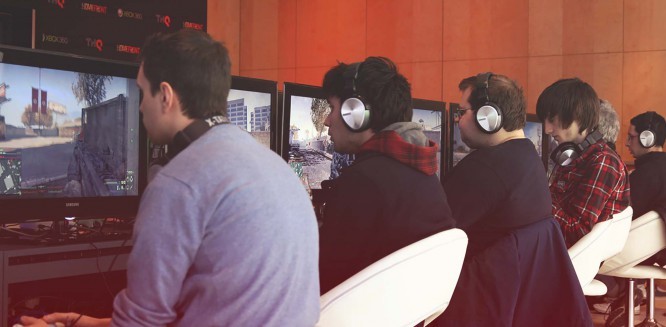4 reasons why web designers should play video games more
4 reasons why web designers should play video games more
Translation of the article “4 reasons web designers should be playing more video games” from the Webdesignerdepot blog on why web designers should play video games.
No, you really should play more. If anyone asks you why you’re chasing your favorite online shooter at three in the morning, you can point your finger at this article and say, “See? See? “
We should all play multiplayer and co-op games because, like it or not, our business is not only about building websites. It’s also about people.

Some have written about game elements used in design. Some are about tricks that we can glean from game interfaces. We would like to talk about what we can learn about ourselves, about other people and human behavior in general, playing multiplayer games.
This can be especially helpful for introverts. The best way to learn how to communicate with people is through practice. Well, why not practice in a safe environment at home?
Lesson 1: We Are All Together (Except The Guys Who Play Against Us)
When someone hires you to create a website, or when you get a job with someone else, you form a team. The client is not the last in this command.
In the heat of an argument about how to solve a given problem, it’s easy to lose all team spirit. Especially when your opponent has little understanding of the mechanics of the game or the principles of good design. Such people can become obstacles to the process.
In fact, they are not obstacles. Their ignorance, fear, or anything else that makes communication difficult is the obstacle. In the game, it is important to remember that your main goal is to finish off the other team. In the work, sometimes you have to remind an overly anxious client that you want the site to work and be effective as much as he does. You put an equal effort into it, and you are not enemies to each other.
Lesson 2. Help newbies, ignore noobs
Some people are not very beginner friendly, and this is a pernicious tendency. If you mistreat new players, the game only loses out. Newcomers should be greeted with understanding, care and respect. They also spend time playing, and possibly money.
“Nubs” are those players who flatly refuse to learn, even though they have been playing for several years. They do not listen to advice, while they love to give it to other players, and sometimes their antics lead the team to defeat. Such people, more often than not, cannot be changed.
In our work, it’s easy to forget that not everyone was taught online games at school. Some only know how to check mail, some have spent their entire lives at game consoles. Therefore, patience is more than just a virtue in such situations.
However, some people are simply hopeless, be they a client or your colleague. You should stay away from these noobs before you get disenchanted with people. Seriously. If you are not careful, you will fail, and you will decide that working alone is not so bad. Working alone is great, unless it’s forever.
Lesson 3. People remember the impression you made
When I see a familiar face on my team, one of the things happens:
– I will be happy because I remember that I like them.
– I will be unhappy because I remember unpleasant feelings.
More often than not, I can’t even remember what happened, or who was to blame. Most people tend to forget bad things – this is normal and natural. What we remember is most often superficial feelings.
Both play and work should be based on friendly relationships. You cannot be liked by everyone: there are so many factors influencing it that it’s not even funny. But you can express your thoughts directly, and as calmly as possible.
If the emotion you do not want to show is overflowing, turn off the microphone, do “AAAAAARRRRRRR” and continue. You don’t need to show it to everyone. If you need to “get rid” of another player, do it as quietly and without fanfare as possible.
In your work, you may never meet this person again, but he will certainly tell others about you. He could have pissed you off, but you don’t need to tell him about it, unless you are sure that he is thick-skinned enough and will accept it as a kind of honesty. However, it is unlikely that someone who does not like you will praise your work in front of others.
Lesson 4. Be clear, be specific
In dynamic games, the speed of communication plays an important role. This sometimes happens via voice chat, where you can use words and tone to convey information.
When you play (or work) with a new person, both of you adjust to each other as you communicate. Each client or team member is unique. Their fates were different, their skills are different, so not everyone will understand your slang and your abbreviations. There is no individual communication formula – there is only a trial and error method.
Conclusion
Play games and chat with people. There is much more to learn from multiplayer games than we have covered here, and you will have to learn all this on your own. And remember that only practice will make you an effective and helpful employee.
So go and knock out a couple of frags, and don’t forget to eat and sleep!
Translated by: Vasily Fedotovsky
…

